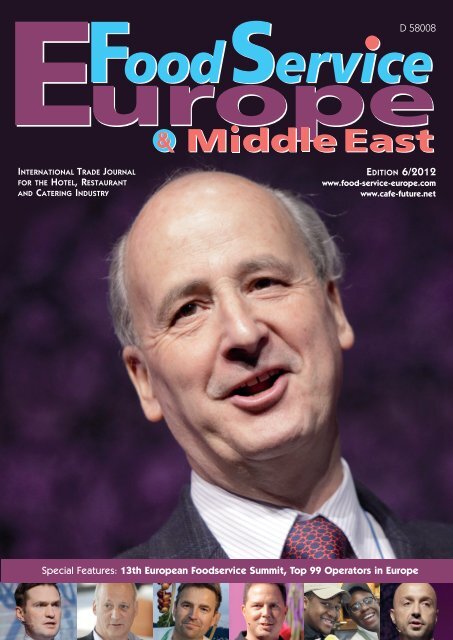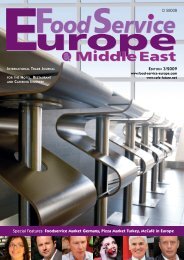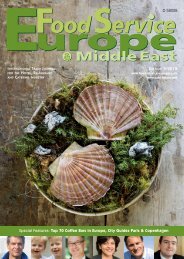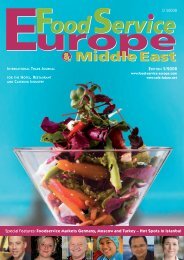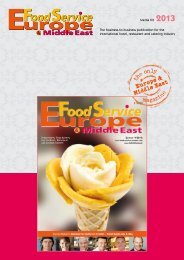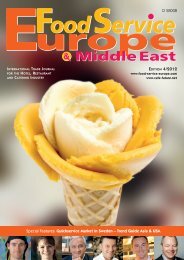D 58008 - Food Service Europe
D 58008 - Food Service Europe
D 58008 - Food Service Europe
- No tags were found...
Create successful ePaper yourself
Turn your PDF publications into a flip-book with our unique Google optimized e-Paper software.
The 200-seat store in Dammam isthree times the size of those backhome in New Zealand and so farthe biggest. “Producing NZ-styleburgers in another country as foreignas Saudi Arabia, has been amajor undertaking,” says ChrisMason.The specialist store fit-outs weremade in New Zealand and exportedin containers to the Gulf States.The Dammam store needed like allrestaurants in Saudi Arabia a speciallayout with a separate doorand eating area for men withoutfamilies.In 2011 two more stores in SaudiArabia opened and two more inDubai. Another Master LicenseAgreement was made in the sameyear, this time with Iraq.Baghdad’s Ra Ali Group, a consortiumwhich also owns 50% ofIraq’s North Bank financial institutionas well as 50% of Pepsi Iraq,bought the rights.The first Iraqi BurgerFuel is locatedin Sulaymaniyah in the Kurdishspeaking region of Northern Iraqknown as Iraqi Kurdistan. Thisarea is the only legally defined regionwithin Iraq that has its ownseparate democratic governmentfor its population of nearly fivemillion people. “It is hard to seethis from the outside but it is reasonablysafe here,” says Mason.■ ■ ■BurgerFuel ■ ■Restaurants (9/2012)New Zealand 30Middle East 9Australia 1Category Fast CasualHeadquarters AucklandSystem Sales NZ$38.1 m(¤24 m) in 2011(end 31 March 2012)Restaurant SizeNZ: 40 to 60 seatsME: slightly biggerFranchise Type CountryRights, Master LicenseAgreementsMenu Gourmet Hamburgers,Fries, Wraps, SoftDrinks, Milk Shakes, IceCreamFor Roberts the Iraqi partnershipis “an interesting prospect withstrong and established businesspartners, who have a good understandingof the BurgerFuel brandand local markets.”Libya and Kuwait followed in 2012with franchise agreements. Themaster license agreement for Kuwaitwas signed with Al KhayyatInvestments (AKI), who alreadyoperates five stores in Dubai in theUnited Arab Emirates and has anothereight sites under constructionor scheduled to open in 2013.In Libya BurgerFuel has partneredwith the Sadeen General TradingCo. The local company operatesCaffè di Roma as well as a host ofinternational brands such asLavazza coffee and Villeroy &Boch.“We saw Libya as one of the leadingcountries to enter in the Northof Africa. Democracy is flourishingright now so this is a sought aftermarket to enter and to take firstmover advantage in,” commentsMason. The focus on growth in theMiddle East saw him and his familyrelocate to Dubai in 2009 to takeup the role of CEO InternationalBusiness. Roberts holds the role ofGroup CEO.The political situation in Libya,however, remains unstable. Theruling National TransitionalCouncil, which took over whenGaddafi was overthrown, hasstruggled to impose its authorityover the militias involved in lastyear’s uprising.“When you watch these things onCNN they look pretty scary butwhen you’re in the markets andworking away, trying to conquerthese countries by selling hamburgers,it’s never as severe as itappears,” Roberts says.“Franchising is a good way of doingbusiness in volatile regions, asthe franchisees bear most of therisk,” he adds. BurgerFuel ownsthe rights for the countries and issuesmaster licenses for the entirecountry. “Our focus on the MiddleEast has been good for our brand.”“Preferably we are looking forpartners who have a food andbeverage division. They should alsohave knowledge of real estate,FOODSERVICE EUROPE & MIDDLE EAST 6/1247
FAST CASUALIn New Zealand BurgerFuelis running 30 stores andhopes to open morerestaur ants in the MiddleEast (right: high streetstore in Auckland City,New Zealand).Josef Roberts (left) andChris Mason met the newmaster licence franchiseholder in Qatar (below).Libyabecause this is always an issue,” says Mason.20 stores per territory is the target.”We want to be with partners who arepassionate about our brand and have theability to roll out,” adds Roberts.In the Middle East BurgerFuel restaurantsare mainly located in malls due thetemperatures outside and the shoppinghabits of the consumers. The model inNew Zealand, however, is based on thehigh streets. “We prefer an outside approachto get visibility and build thebrand,” says Roberts. The kiwi restaurantsusually have 40 to 60 seats and,where possible, an outside area.The offer in the Middle East is identicalto the one in New Zealand, except thatpork and bacon are replaced with chickenor beef. “Using our own halal beef ensuresthat we are delivering the best possibleburgers,” says Mason. All condimentingredients come from New Zealandas well. BurgerFuel has a reputationfor their aioli sauces and the patented‘doofer’, a folding cardboard burgerholder.!Our focus on theMiddle East has been goodfor our brand.BurgerFuel buys its beef from Anzco<strong>Food</strong>s, a multinational group of companies,whose core business is to procure,process and market New Zealand beefand lamb products. Anzco produces finishedbeef patties to specific standards.They are then snap frozen and sent tothe stores in New Zealand and overseas.Buns and vegetables are sourced locally.The buns are created to the recipes of theNew Zealanders. “Our processes are reallystandardized and tight,” says Roberts.The most sought after burger on theBurgerFuel menu is the cheeseburger:1/3 pound 100% pure NZ grass fed beef,melted cheddar, grated parmesan, salad,relish and fresh natural BF aioli atNZ$9.90 (¤6.24).Chicken-, Vege- and Mini-burgers are alsooffered as well as drinks, ice cream andtypical kiwi sides such as potato or kumarafries. “Most of the original itemsare still on the menu, but we have specialson a rotating basis,” says Mason.Wages in the Middle East are slightlylower than in New Zealand. Hence laborcosts are lower, but rents are high in relationto other parts of the world, arguesRoberts without disclosing the relationof wages to goods and rents compared toNew Zealand.BurgerFuel caters to the 18- to 35-yearolds.In the Middle East customers aregenerally 50% locals and 50% expats.BurgerFuel has developed into an icon inthe region, believes Mason. “Everythingis being very well received, because wemolded and crafted the business andtailored the brand,” he says.In March this year the company reportedstrong profit growth with an after tax figureof NZ$708,360 (¤446,747), fromNZ$33,500 (¤21,116) a year earlier.Company revenue rose 24% on the previousyear to NZ$10.3 m (¤6.5 m), whiletotal store system sales, which includefranchisees’ revenue, lifted 15.5% to$38.1 m (¤24 m). In the Middle East systemsales rose to NZ$ 8.6 m, which is dueto pricing improvements, according toRoberts.By the time when the annual report waspresented, the company was runningeight stores in the Middle East, 28 inNew Zealand and one in Australia.Since then it opened two more stores inNew Zealand and hopes to open morethan six restaurants in the Middle East,including Qatar and Egypt.“It’s not only about having the best burger,it’s also about having the bestbrand,” says Roberts. “We are marketingguys and we like to put some humor intoit.” The design of the brand with its signatureblue and purple color is unique andreflected on the website. Social mediasuch as Facebook and Twitter play an integralpart of the marketing concept. Acouple of years ago BurgerFuel won an48 FOODSERVICE EUROPE & MIDDLE EAST 6/12
FAST CASUALaward for having the best Social Mediasite in New Zealand. In July 2012 thecompany started its own internet-based‘radio station’ streamed via the web intoits stores throughout New Zealand.While the Middle East is successful, operationsdid not go well in Australia,where two stores were initially opened.One store in Sydney closed in November2010 “due to the rising operational costs,particularly the labour costs which haverisen by more than 50% during the pastfour years”.!Producing NZ-style burgersin another country as foreignas Saudi Arabia, has beena major undertaking.The home market in New Zealand, however,is still growing. Just recently a newrestaurant opened close to Auckland. Thecompany operates mainly in the North Islandbut does not have a South Islandfootprint so far, however, a restaur ant inChristchurch is planned.The fast-food category in New Zealand(4.4 m inhabitants/largest city: AucklandCity with 1.486 m inhabitants) isestimated to be worth around NZ$1.7 bn(¤1.07 bn) annually. Leader McDonald’sNZ claims a market share of 40%. Theirtotal annual sales are around NZ$680 m(¤429 m), which includes 131 storesowned by franchisees, which make up80% of their 160-restaurant network.Bur ger King runs 80 restaurants andfamily-owned Wendy’s NZ has 17 outlets,mainly in the North Island.The market is made up of seven majorplayers including KFC, Pizza Hut andDomino’s. ‘Restaurant Brands’ operatesthe local outlets of KFC and Pizza Hutand has recently acquired Carl’s JR.Although Roberts concedes that everybodywho is in the food business is acompetitor – “we are talking about theshare of the stomach here” – he sees thecompany belonging to a different categorythan that of the big players such asMcDonald’s or Burger King. “Our productquality is higher, so are our prices ofcourse, we offer gourmet burgers and inthis fast casual segment we are the marketleaders in New Zealand,” he argues.Roberts and Mason are always on thelookout for business opportunities. Newworld markets such as China are at themoment of particular interest. “There’sno doubt that China is moving in a certaindirection with a growing middleclass,” says Roberts.“We are interested in expanding globallythat is really the bottom line. We arenow regarded as an international brand,to be a global brand by definition youwould have to be in 15 or 20 countries.We hope we are there in ten years time.”In <strong>Europe</strong>, Germany in particular is onthe agenda.■


